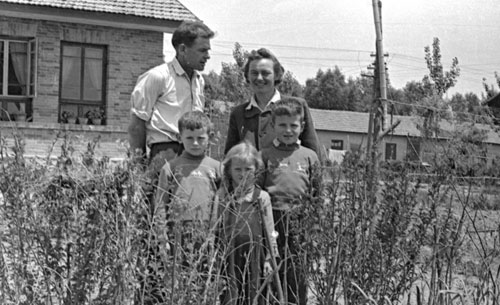A distant connection
Updated: 2012-11-26 17:56
By Han Bingbin (China Daily)
|
|||||||||||
 |
|
From top: Yang Heping (right) with his parents, Erwin Engst and Joan Hinton, and his brother and sister. [Photos provided to China Daily] |
With the glowing tributes paid to his parents by both the people and the government, Yang says they were simply doing what they loved. Explaining why his parents chose to stay so long in China, Yang says it was the harmonious revolutionary atmosphere, where people were equal despite their differences and all were happily united in a concerted effort.
For Yang, his own road to accepting what he really is was a little bumpier.
Yang's grandmother used to send him clothes from the US, but he often found them too odd to wear. In 1962, the old lady came to visit her grandson and became the "first foreigner" young Yang had ever met. Barely speaking any English and reluctant to learn, Yang had little to say to her.
It was not until the late 1960s that Yang became more eager to learn his mother tongue, propelled by a strong desire to understand the speeches delivered by the leaders of the African-American Civil Rights Movement. But language is not genetically in-built, Yang says, and English was hard for him to learn. His parents, closely involved in the socialist revolution and the construction of the country, were too busy to teach him.
At a time when there was intense ideological conflict between China and the US, Yang was an active member of protests against US imperialism, although his classmates would often tease him by shouting, "Down with US imperialism!" in his face.
Yang has inherited the spirit of his parents, says Li Weimin, former Party secretary of the Chinese Academy of Agricultural Mechanization Sciences where Yang's parents had worked. Growing up at a time when people strove for a better future and disregarded personal interests, Li says Yang has become a man with sound ideals and social responsibility.
After moving to Beijing from Xi'an in 1966, Yang soon found his role in the "cultural revolution" (1966-76) after his mother joined the "rebel group" to challenge the authorities.
Responding to the call for youths in and outside Beijing to learn from revolutionary experiences, Yang went to Yangquan in Shanxi province in late December 1966 and came back in early February 1967, with most of the time spent "in a coal mine helping the rebels with their grievances".
While some educated youths grieved over being sent to the countryside for re-education, Yang offered to go. After his application was rejected, he ended up as a worker in a timber processing plant in Beijing in 1969.
In 1974, attracted by the descriptions of the US in a letter from his cousin, Yang finally visited his homeland out of curiosity. The new experiences began with amazement.
He was fascinated by the advanced machinery at his uncle's farm.
Related Stories
Urban oasis 2012-11-26 14:04
Wansan Cruise 2012-11-23 17:11
Beijing Transportation 2012-11-22 16:59
Winter scenery of Hengshan Mountain 2012-11-22 16:56
Beijing Transportation-Bus 2012-11-22 15:18
Today's Top News
Rescuers race against time for quake victims
Telecom workers restore links
Coal mine blast kills 18 in Jilin
Intl scholarship puts China on the map
More bird flu patients discharged
Gold loses sheen, but still a safe bet
US 'turns blind eye to human rights'
Telecom workers restore links
Hot Topics
Lunar probe , China growth forecasts, Emission rules get tougher, China seen through 'colored lens', International board,
Editor's Picks

|

|

|

|

|

|





